
No intimate theater company in L.A. has produced more—or more consistently excellent—intimate revivals of contemporary Broadway classics over the past half-dozen years than August Viverito and TL Kolman’s The Production Company. Now, following in the illustrious footsteps of The ProdCo’s M Butterfly, Equus, Copenhagen, Amadeus, and The Beauty Queen Of Leenane, comes Viverito and Kolman’s latest (and one of their best), Ketti Frings’ 1957 Pulitzer Prize-winning adaptation of Thomas Wolfe’s Look Homeward, Angel.
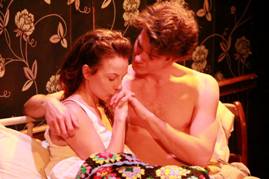 Frings had her work cut out for her in trimming Wolfe’s 550-page autobiographical novel down to a 99-page coming-of-age play, and truth be told, 2013 audiences might wish she’d cut it even further. Nothing particularly dramatic happens in the play’s Act One set-up, and audiences grown used to today’s 90-minutes-no-intermission format may balk at a play that lets out after 11:00.
Frings had her work cut out for her in trimming Wolfe’s 550-page autobiographical novel down to a 99-page coming-of-age play, and truth be told, 2013 audiences might wish she’d cut it even further. Nothing particularly dramatic happens in the play’s Act One set-up, and audiences grown used to today’s 90-minutes-no-intermission format may balk at a play that lets out after 11:00.
But be patient. An extraordinarily powerful second act makes Act One’s time investment worth it (though some will still surely wish that Samuel French allowed the kind of judicious trimming that would get us to Act Two about half-an-hour sooner).
Frings’ stage adaptation recounts in considerable detail three weeks in the life of seventeen-year-old Eugene Gant (Grant Tambellini, following in the illustrious footsteps of a young Anthony Perkins), a book-loving 1916 teen longing to escape from the boarding house run by his mother Eliza (Alison Blanchard in Jo Van Fleet’s 1957 Broadway role) and his drunkard of a stone-cutter father W.O. (Geoffrey Wade in the role originated by Hugh Griffith).
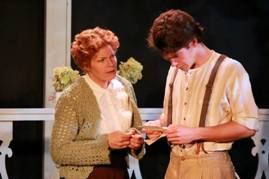 We spend most of Act One getting to know Eugene, his parents, his older brother Ben (AJ Jones in the role first brought to life by Arthur Hill), and assorted family members and residents of the Dixieland Boarding House: older sister Helen (Christiane Amorosia) and her salesman husband Hugh (Hugh Kinslow), Uncle Will (Kelly McCracken), mother-son boarders Jake and Mrs. Clatt (Alex Denney and Amelia White), excitement-craving Florry Mangle (Mary Mather), local GP Dr. Maguire (Bill Lewis), and Marie “Fatty” Pert (Michelle Simek), the full-figured older woman brother Ben finds motherly comfort in.
We spend most of Act One getting to know Eugene, his parents, his older brother Ben (AJ Jones in the role first brought to life by Arthur Hill), and assorted family members and residents of the Dixieland Boarding House: older sister Helen (Christiane Amorosia) and her salesman husband Hugh (Hugh Kinslow), Uncle Will (Kelly McCracken), mother-son boarders Jake and Mrs. Clatt (Alex Denney and Amelia White), excitement-craving Florry Mangle (Mary Mather), local GP Dr. Maguire (Bill Lewis), and Marie “Fatty” Pert (Michelle Simek), the full-figured older woman brother Ben finds motherly comfort in.
We learn of Ben’s longing to go fight “the Huns” in the ongoing European war, a desire quickly thwarted by Dr. Maguire, who realizes that Ben’s cough may be more than just the side-effect of an addiction to cigarettes and coffee. We see W.O. at his most insufferably, disruptively drunk. We learn that Eliza has her heart on selling W.O’s marble yard/shop and pocketing a neat $20,000 (over $400,000 in today’s currency) on the sale. And we meet the Dixieland’s latest boarder, “older” woman Laura James (Marika Engelhardt), with whom young Gene soon finds himself head over heels in love.
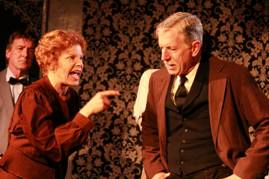 It’s not until Act Two that “stuff happens” in Look Homeward, Angel, none of which will be revealed here except to say that the second act provides a powerful payoff to our Act One investment—laughter and tears and hope and despair and (to steal the title of a Maggie Smith flick from the ‘60s) “Love And Pain And The Whole Damn Thing.”
It’s not until Act Two that “stuff happens” in Look Homeward, Angel, none of which will be revealed here except to say that the second act provides a powerful payoff to our Act One investment—laughter and tears and hope and despair and (to steal the title of a Maggie Smith flick from the ‘60s) “Love And Pain And The Whole Damn Thing.”
Under Kolman’s expert direction, Look Homeward, Angel’s three stars deliver stunning, multilayered performances, beginning with L.A. newcomer Tambellini, commanding the stage and winning our hearts as the shy, awkward, hopelessly romantic Eugene. Blanchard is a force of nature as the penurious, possessive Eliza, and Wade is equally memorable as her philandering drunk of a husband.
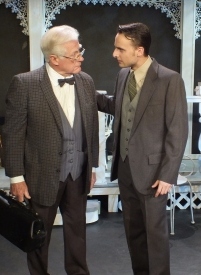 An outstanding Jones is heartbreakingly real in conveying Ben’s largely wasted life. Engelhardt does winning work (and has believable romantic chemistry with Tambellini) as the woman who awakens Gene’s heart to the first stirrings of love. Doubling as the local madam, the always wonderful White not only gives us two very different women, it’s a treat to get to see Mr. and Mrs. Geoffrey Wade sharing the stage in a wonderfully played scene between W.O and a grieving Madame Elizabeth.
An outstanding Jones is heartbreakingly real in conveying Ben’s largely wasted life. Engelhardt does winning work (and has believable romantic chemistry with Tambellini) as the woman who awakens Gene’s heart to the first stirrings of love. Doubling as the local madam, the always wonderful White not only gives us two very different women, it’s a treat to get to see Mr. and Mrs. Geoffrey Wade sharing the stage in a wonderfully played scene between W.O and a grieving Madame Elizabeth.
Amorosia, Kinslow, Lewis, Mather, McCracken, and Simek all make vivid impressions in finely-tuned supporting and cameo turns, with special snaps for charismatic newcomer Denney, who demonstrates versatility doubling as older brother Luke Gant.
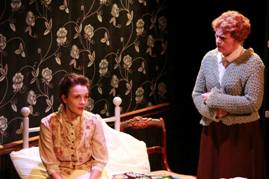 The broad Secret Rose stage permits scenic designer Viverito to create a multi-locale set that neither of The ProdCo’s previous digs would have allowed, giving us the Dixieland veranda, W.O.’s shop, and various bedrooms (one of them cleverly hidden until a pivotal Act Two scene). Viverito’s costumes are period treats too, and Matt Richter’s lighting once again demonstrates the L.A. designer’s expertise at creating a mood or revealing a time of day. Assistant director Phil Talsky’s sound design provides atmospheric musical underscoring between scenes and authentic sounding effects.
The broad Secret Rose stage permits scenic designer Viverito to create a multi-locale set that neither of The ProdCo’s previous digs would have allowed, giving us the Dixieland veranda, W.O.’s shop, and various bedrooms (one of them cleverly hidden until a pivotal Act Two scene). Viverito’s costumes are period treats too, and Matt Richter’s lighting once again demonstrates the L.A. designer’s expertise at creating a mood or revealing a time of day. Assistant director Phil Talsky’s sound design provides atmospheric musical underscoring between scenes and authentic sounding effects.
John Couch is 2nd assistant director. Pat Willson is dialect coach. Scott Fleming is production stage manager.
Look Homeward, Angel is precisely the kind of play folks are referring to when they say, “They don’t write’em like that anymore.” Yes, shorter might indeed be more in tune with contemporary tastes. Still, there’s no denying the many pleasures of this lengthy but ultimately quite rewarding mid-20th Century gem.
The Production Company at the Secret Rose Theatre, 11246 Magnolia Boulevard, North Hollywood.
www.theprodco.com
–Steven Stanley
November 15, 2013
Photos: Joanna Strapp
Tags: Ketti Frings, Look Homeward Angel, Los Angeles Theater Review, The Production Company, Thomas Wolfe


 Since 2007, Steven Stanley's StageSceneLA.com has spotlighted the best in Southern California theater via reviews, interviews, and its annual StageSceneLA Scenies.
Since 2007, Steven Stanley's StageSceneLA.com has spotlighted the best in Southern California theater via reviews, interviews, and its annual StageSceneLA Scenies.







 COPYRIGHT 2024 STEVEN STANLEY :: DESIGN BY
COPYRIGHT 2024 STEVEN STANLEY :: DESIGN BY